|
|
|
Sort Order |
|
|
|
Items / Page
|
|
|
|
|
|
|
| Srl | Item |
| 1 |
ID:
177512


|
|
|
|
|
| Summary/Abstract |
The following is an edited transcript of the 102nd in a series of Capitol Hill conferences convened by the Middle East Policy Council. The event took place on October 23, 2020, via Zoom with Council Vice-Chair Gina Abercrombie-Winstanley moderating, Council President Richard J. Schmierer contributing, and Council Executive Director Thomas R. Mattair serving as discussant.
|
|
|
|
|
|
|
|
|
|
|
|
|
|
|
|
| 2 |
ID:
177521
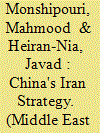

|
|
|
|
|
| Summary/Abstract |
This paper seeks to unpack China's grand energy policy in the Middle East. It examines the proposed Iran-China deal, to which China's great game in Iran presents new challenges. Beijing sees Iran as a key potential asset in Western Asia. Regional experts argue that, given Iran's extensive natural resources and human capital, as well as a relatively untapped market, the country is seen by the Chinese ruling class as a potentially valuable ally. Uncertainty, pessimism, and a deeply rooted culture of resistance against foreign influence and intervention help explain why skepticism about this deal is so pervasive in Iran. A closer look at Iran's history also illustrates that the country's interests would likely be more effectively served if it diversified its economic and political relations with both the West and the East, thus allowing the government to balance its relationship with those countries while retaining a degree of political independence.
|
|
|
|
|
|
|
|
|
|
|
|
|
|
|
|
| 3 |
ID:
177514
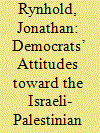

|
|
|
|
|
| Summary/Abstract |
Since 2015, there has been a sharp turnaround in US Democrats’ sympathies for Israel and the Palestinians. The percentage of Democrats with a preference for Israel is more or less tied with those preferring the Palestinians, wiping out Israel's historic advantage. Long-term processes of liberalization and secularization have generated a more difficult environment for Israel and a more favorable one for the Palestinians, but they alone do not account for the shift. Rather, the fusing of these trends with changes in Israel triggered the change. The formation of a narrow right-wing government in 2015 played a significant role. However, the primary cause of the collapse in sympathy for Israel was the way in which Prime Minister Benjamin Netanyahu's Republican-first strategy to block the Iran nuclear deal turned Israel into a highly salient motif of partisanship at a time of unparalleled hostility between the two major US parties. While the fall in sympathy for Israel spans both wings of the Democratic Party, the sharp increase in sympathy for the Palestinians has occurred primarily among liberal Democrats. It is intertwined with the growing political salience of Black Lives Matter, which helps to generate a narrative associating racial discrimination in America with the plight of the Palestinians.
|
|
|
|
|
|
|
|
|
|
|
|
|
|
|
|
| 4 |
ID:
177519


|
|
|
|
|
| Summary/Abstract |
The author analyzes the final judgment of the UN tribunal convened to inquire into the assassination of former Lebanese Prime Minister Rafiq Hariri. Only one of the four men originally charged was found guilty, wholly on the basis of alleged cell-phone communications. Although Israel was known to have comprehensively penetrated the Lebanese telecommunications sector, the tribunal made no attempt to prove conclusively that the cell-phone calls allegedly made by the accused were actually made by them and not fabricated by a third party. This significant omission undermines the authenticity of the evidence. The tribunal also failed to consider the possible involvement of two governments that have a long history of subversion and violence in Lebanon, the United States and Israel, both totally hostile to Hezbollah and the Syrian government. All of these elements combined raise serious questions about the course of the tribunal's findings from the beginning.
|
|
|
|
|
|
|
|
|
|
|
|
|
|
|
|
| 5 |
ID:
177520
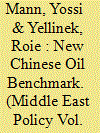

|
|
|
|
|
| Summary/Abstract |
China introduced a new oil benchmark in March 2018, part of a bid to establish its position as an economic superpower. This article analyzes the impact of this new index on the Middle East, a key region where much of the oil on which the index is based originates, by focusing on market transparency, market determination, government involvement, physical accessibility, and the internal Chinese dialogue. The article then discusses the political, financial, and economic view from the Middle Eastern perspective. It finds that China still has a long way to go before it can turn the new oil benchmark into an international standard. In addition, the Shanghai Stock Exchange was launched just before the escalation of the trade dispute between the world's two largest economies, the United States and China. While this fight could hurt the traditional indices and elevate China's new oil benchmark, the coronavirus, which has spread worldwide from China, is another factor that may affect the quality and impact of this new index.
|
|
|
|
|
|
|
|
|
|
|
|
|
|
|
|
| 6 |
ID:
177518


|
|
|
|
|
| Summary/Abstract |
For nearly a century, the absence of ethical norms within Lebanese political circles encouraged the practice of corruption that transformed the praxis into an unparalleled art form, one that generated clout-wielding elites. Sophisticated public power mechanisms created for the benefit of the country's eighteen religious denominations, transformed them into partners-in-corruption, secured greater quotas of power, and exclusive hold on all public resources. What this translated into was a “neo-patrimonial” dynamic, which the October 2019 revolutionaries challenged, with calls to reconsider the political management of the country as well as the existing system of government. The 2020 impact of the Coronavirus (COVID-19) disease aggravated conditions, as Beirut displayed amateurish attention to serious health challenges, which added insults to ongoing economic injuries. This paper evaluates what political elites actually did, even at the height of enduring crises, focusing on the banking sector to highlight the rise of a new mafiocracy. It closes with an assessment of future challenges that Beirut will confront.
|
|
|
|
|
|
|
|
|
|
|
|
|
|
|
|
| 7 |
ID:
177516
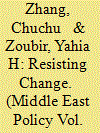

|
|
|
|
|
| Summary/Abstract |
A recurrent question is whether Islamist parties surreptitiously capitalize on political change to weaken or establish their own authoritarianism. In this article, we contend that the answer to this question depends largely on how ruling elites in authoritarian systems structure and manage the Islamist marketplace, thus affecting the position of Islam in politics and society. In our comparative analysis of Tunisia and Algeria, we distinguish between a state-dominated Islamist marketplace and a managed, open, pluralist Islamist marketplace. We postulate that Islamist parties in monopolized Islamist marketplaces are more likely to gain ground when they challenge authoritarianism. Thus, the marginalization/repression of Islamist political parties cannot, nor should it, seek to eliminate Islamist sentiments, while the opening of an Islamist pluralist marketplace is less likely to produce a hegemonic Islamist political party. The analysis of the trajectories of the Islamist movements informs on the management of Islamism and provides lessons for the Middle East and North Africa (MENA) and, conceivably, Islamic States elsewhere. Therefore, both policy makers and academics should renounce “de-Islamizing” an Islamic society and focus instead on judicious approaches to managing Islamism in Muslim-dominated societies and integrating Islamist parties into a democratic polity.
|
|
|
|
|
|
|
|
|
|
|
|
|
|
|
|
| 8 |
ID:
177517


|
|
|
|
|
| Summary/Abstract |
The Karabakh region and surrounding territories—occupied by Armenia for the last 26 years—represented a classic “frozen” ethno-territorial conflict in the post-Soviet world. The conflict erupted in September 2020, and Azerbaijan managed to liberate the occupied territories. This article examines the causes and consequences of the recent Karabakh war between Armenia and Azerbaijan. After summarizing the historical origins of the conflict, the article offers an analysis of four main causes that renewed hostilities. The 44-day war resulted in a military victory for Azerbaijan and catastrophic defeat for Armenia. The outcome not only shook up the Armenian political establishment, but also revealed a contentious dimension in the alignment between Turkey and Russia. The article concludes by analyzing the motives of Turkey's extensive involvement in the conflict and the Russian-imposed truce deal, both of which are likely once again to freeze the dynamics that hold the central parties hostage to Russia.
|
|
|
|
|
|
|
|
|
|
|
|
|
|
|
|
| 9 |
ID:
177515


|
|
|
|
|
| Summary/Abstract |
After a decade of civil war, hundreds of thousands of casualties and immense destruction is now clear that Bashar al-Assad won the war in Syria. Assad's victory in the war is the result of a variety of reasons, one of them is the military and economic assistance he received from Russia, his close ally. The present article follows the Russian involvement in Syria and examines what are Russia's interests in Syria? Has the Kremlin taken a uniform and consistent diplomatic position towards Syria and the Middle East, both in the Soviet era and after the fall of the USSR, or has its policy changed over the years? Why did Moscow see fit to intervene in the internal Syrian conflict in 2015, considering that until then the United States seemed to have been dominant in the Middle East? Finally, did Russia take this action out of global motives that go beyond the regional context? In this context, the main argument of this article is that the Syrian civil war gave Moscow a one-time opportunity to penetrate the Middle East more deeply and further its ambitions in the region. Moscow identified an outstanding opportunity to restore its status as a superpower and promote its regional and global objectives, at the expense of the United States.
|
|
|
|
|
|
|
|
|
|
|
|
|
|
|
|
| 10 |
ID:
177513
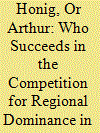

|
|
|
|
|
| Summary/Abstract |
Since the end of World War II, several local actors have tried to gain regional dominance in the Middle East. These attempts have met with varying levels of success. This study seeks to explain this variation. We will not address the equally important question of when and why specific states decide to make bids for regional dominance. We maintain that while realism is a useful theoretical lens for explaining this variation, it is necessary to adjust some realist assumptions slightly to make realism work well in the Middle Eastern context. This is so because realism was developed based on modern European and American experiences. Specifically, our adjustments of realism's assumptions produced the following three preconditions that must be met for a local actor's bid to succeed. First, one must pursue those types of power which are the most potent at a specific time given the Middle Eastern environment. Second, while traditional realists recommend forging large coalitions by reducing threat perception and making bargains through traditional diplomacy or Realpolitik, we argue that domination through subversion or intimidation is more effective. Third, one must not only avoid counterproductive intervention by the great powers, but also have them actively on one's side.
|
|
|
|
|
|
|
|
|
|
|
|
|
|
|
|
|
|
|
|
|